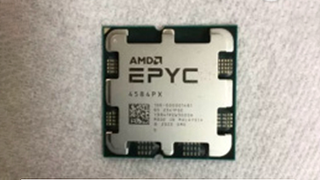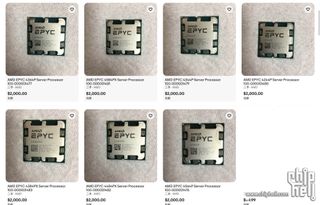AMD's server CPUs arrive on mainstream PC motherboards — EPYC 4004 CPUs with 3D V-Cache for AM5 platform already on sale at eBay
EPYC CPUs for the AM5 socket.

A few days ago, a rumor circulated that AMD was prepping EPYC 4004-series processors based on the Zen 4 architecture in the AM5 form factor. Today, an enthusiast from ChipHell forums said that he had spotted these CPUs on eBay. Since the information comes from an unofficial source, throw a pinch of salt over the information.
Since AMD's EPYC 4004-series processors come in AM5 packaging, we believe they will replicate core count specifications from their desktop brethren, so do not expect them to have more than 16 cores or feature an EPYC I/O die. After all, packaging caters to particular CCDs and IODs in terms of physical dimensions, power supply, and I/O capabilities.
Meanwhile, assuming these EPYC CPUs are real, expect them to use premium silicon and support essentially the same features as AMD's Ryzen Pro 7000-series processors, perhaps without remote management. Meanwhile, AMD's EPYC 4004-series products could target data-intensive applications, such as small business servers, branch servers, backup and storage servers, development/testing servers, or dedicated applications servers, where high processing power and extended availability are required. Servers in tower form factor are still quite a thing, despite the pervasiveness of the cloud.

A close look at AMD's Zen 4 lineup indicates that the company could address those tower servers with a separate product lineup. AMD currently offers multiple Zen 4-based processors, including EPYC 9004-series in SP5 packaging for datacenters and HPC; EPYC 9704-series in SP5 form-factor for cloud datacenters; EPYC 8004-series in SP6 form-factor for telecom and edge servers; Ryzen Threadripper Pro 7000W/WX for extreme workstations; Ryzen Pro CPUs for commercial client PCs; and Ryzen processors for regular client machines.
An avid reader would ask what the critical difference between AMD's EPYC 4004-series and AMD's Ryzen Pro 7000-series CPUs will be. The warranty terms will be the main difference between these processors: the Ryzen Pro family is designed for business and commercial desktops/laptops for eight – 12 hours per day, whereas EPYCs work 24/7, 365 days a year. But this is our speculation, of course.
These CPUs were not available at eBay as of press time. Furthermore, the screenshot demonstrated by the ChipHell forums users indicates the same price for all of these CPUs ($2,000), which seems a bit unrealistic.
Stay On the Cutting Edge: Get the Tom's Hardware Newsletter
Join the experts who read Tom's Hardware for the inside track on enthusiast PC tech news — and have for over 25 years. We'll send breaking news and in-depth reviews of CPUs, GPUs, AI, maker hardware and more straight to your inbox.

Anton Shilov is a Freelance News Writer at Tom’s Hardware US. Over the past couple of decades, he has covered everything from CPUs and GPUs to supercomputers and from modern process technologies and latest fab tools to high-tech industry trends.
-
Metal Messiah. Replywe believe they will replicate core count specifications from their desktop brethren, so do not expect them to have more than 16 cores or feature an EPYC I/O die.
If AMD plans to implement Zen 4C cores as well, then maybe we can also get up to 32 cores and 64 threads. But we don't know whether AMD will go for a dual-CCD route though.
So we have 3 SKUs sporting 3D V-Cache, and the remaining are normal variants ?
EPYC 4584PX - 3D V-Cache
EPYC 4484PX - 3D V-Cache
EPYC 4384PX - 3D V-Cache
EPYC 4564P - Normal/Standard
EPYC 4364P - Normal
EPYC 4344P - Normal
EPYC 4244P - Normal
This sample looks legit, btw. Check the engraved code.
https://i.imgur.com/Si3tSUl.png
Furthermore, the screenshot demonstrated by the ChipHell forums users indicates the same price for all of these CPUs ($2,000), which seems a bit unrealistic.
Yes, pricing is indeed absurd. But they appear to be placeholder values, since the seller is asking customers to contact him for the final quote/price. :sneaky: -
wbfox How is a 16 or 24 core Epyc 8004 all that different in price from a 7950X system? $200ish for CPU price and the increased price for your RDIMM ECC DDR5 (which you would want in the Epyc 4004, so no difference in cost there) and $150-$200 more for motherboard if it can use a normal ryzen motherboard (there go any hopes for added PCIe lanes though). Is there really a market for that, at most, $400 gap without cannibalizing the lower ends of current Epyc and Threadripper? If it was a successor to the Epyc 3000s, that would be great, but does not appear to be the case. So if you have RDIMM support, more PCIe lanes for cheaper (not sure how you get these without new special and higher cost motherboard, which kills off 50% of potential savings as those new motherboards will rival current Epyc motherboards in price), all you do is shift around revenue from the low end current Epycs and Threadripper to the new Epyc and that is only if it is a real price difference as well as the features mentioned (which is why you go for a Epyc or Threadripper for the most part aside from other features of the Epycs which this would not have if it is based on Ryzen), which frankly is not possible. And if it has all of those features, but with faster clocks and the same power draw as Ryzen, how does that just not put the 8004 line, some of the lower 9004 and lower Threadrippers into the dumpster entirely? So they are going to kill off their high dollar items to give customers a route to massive savings at the expense of their profit line? Right. This will be a rebadged Ryzen with maybe a bell, but no whistle. If it actually exists.Reply -
Metal Messiah. I expect AMD to at least make a 32-core count chip since these are targeting a different market segment. Also, curious to know whether these chips will be compatible with current AM5 DIY motherboards, or AMD makes a special AM5 socket variant for these EPYC processors.Reply -
thestryker From what I've seen so far these seem to be rather similar to Intel's recent Xeon E series release. Just a guess on my part but it seems like these are going to be the same as the Zen 4 desktop line with some feature differences.Reply -
TechLurker Man, if these also included full use of all PCIe lanes on high-end consumer mobos, that would be wonderful; able to max out everything for storage purposes and create a home server using both NVMe and SATA drives without having to step up to an actual TR or EPYC platform.Reply -
wbfox Yeah, here's the source of the "leak." https://www.chiphell.com/thread-2601495-1-1.htmlReply
He has an ancient slide posted of something called Epyc 7004 (Genoa before it was 9004 Im guessing) and a successor to the 3000 series being on the shelves for a year already. My money is that this turned into 8004 and he's just making 4004 up completely. No one on the forum seems to be buying it (in either sense of the word) either.
A home Epyc chip literally could not have more PCIe or RDIMM, etc... with out eating into the low end Epyc and Threadripper lines.
The price difference between a 7950x setup and Epyc 8124P is, at most, $300. Depending on how hard you go on the DDR5 RDIMM which isn't the cheapest. There is literally no point. If you need a server, you buy Epyc. If you need hardcore production, you go Threadripper. Yeah it sucks PCIe lanes are the line of demarcation, but capitalism isn't about providing value to customers. It's about the shakedown. I would be the first to cheer at a true successor to 3000 and hand over all my money, but AI need power and all else 8004. So yeah.
Also, the guy sells a bunch of rando, ancient Xeons, some optanes, and also got a totally unreleased version of AMD's next server chip to sell by totally legal means. Right. Do some actual reporting Tom's.
Most Popular



